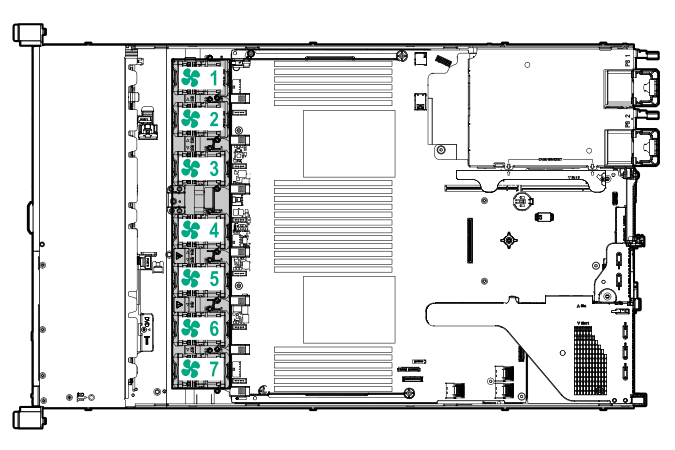Hot-plug fans
The valid fan configurations are listed in the following tables.
One-processor configuration
| Fan bay 1 | Fan bay 2 | Fan bay 3 | Fan bay 4 | Fan bay 5 | Fan bay 6 | Fan bay 7 |
|---|---|---|---|---|---|---|
| Fan blank | Fan blank | Fan | Fan | Fan | Fan | Fan |
Two-processor configuration
| Fan bay 1 | Fan bay 2 | Fan bay 3 | Fan bay 4 | Fan bay 5 | Fan bay 6 | Fan bay 7 |
|---|---|---|---|---|---|---|
| Fan | Fan | Fan | Fan | Fan | Fan | Fan |

The loss of a single fan rotor (one standard fan) causes loss of redundancy. The loss of two fan rotors (two standard fans or one high-performance fan) causes the server to initiate a shutdown.
The high-performance fans are used for 8 SFF +2 SFF NVMe and 10 SFF drive configurations when NVMe drives are installed in the server. They are also required for ASHRAE-compliant configurations. For more information on ASHRAE-compliant configurations, see the Hewlett Packard Enterprise website http://www.hpe.com/servers/ASHRAE.
The server supports variable fan speeds. The fans operate at minimum speed until a temperature change requires a fan speed increase to cool the server. The server shuts down during the following temperature-related scenarios:
- At POST and in the OS, iLO performs an orderly shutdown if a cautionary temperature level is detected. If the server hardware detects a critical temperature level before an orderly shutdown occurs, the server performs an immediate shutdown.
- When the Thermal Shutdown feature is disabled in the BIOS/Platform Configuration (RBSU),
iLO
does not perform an orderly shutdown when a cautionary temperature level is detected. Disabling this feature does not disable the server hardware from performing an immediate shutdown when a critical temperature level is detected.
CAUTION: A thermal event can damage server components when the Thermal Shutdown feature is disabled in the BIOS/Platform Configuration (RBSU).